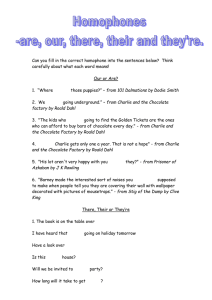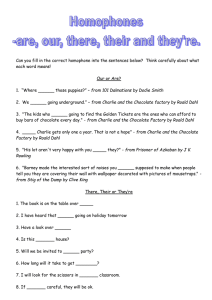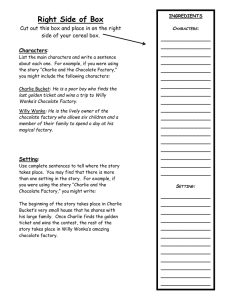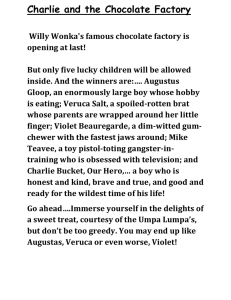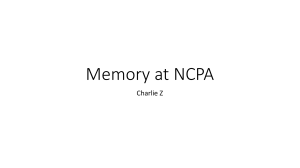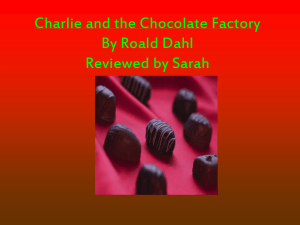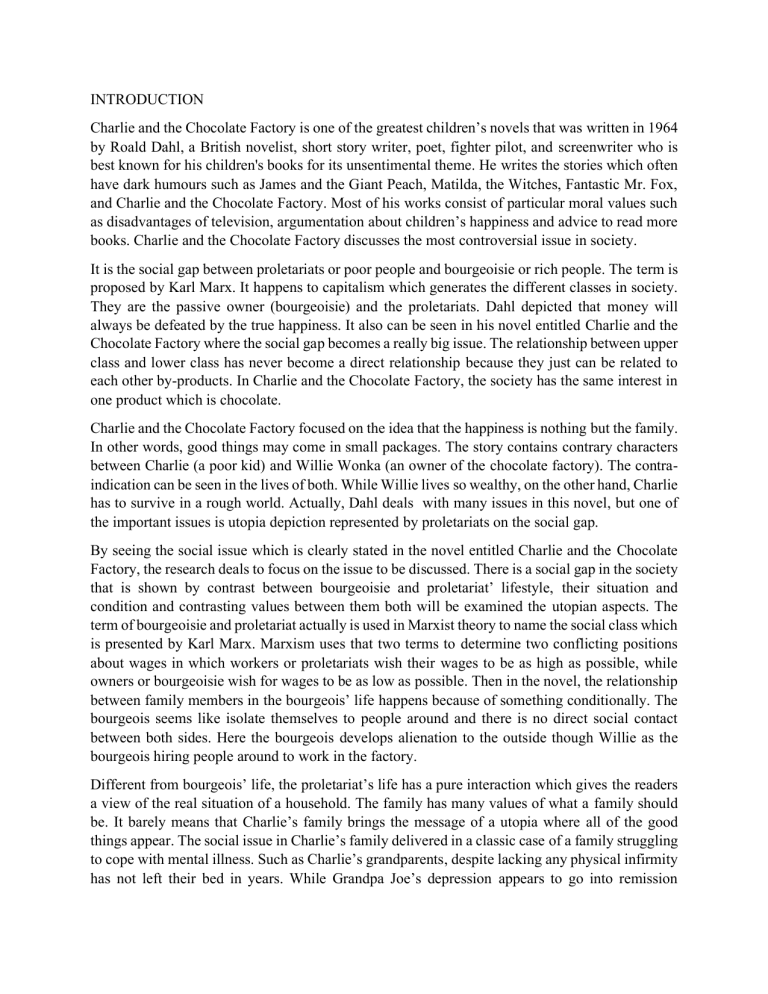
INTRODUCTION Charlie and the Chocolate Factory is one of the greatest children’s novels that was written in 1964 by Roald Dahl, a British novelist, short story writer, poet, fighter pilot, and screenwriter who is best known for his children's books for its unsentimental theme. He writes the stories which often have dark humours such as James and the Giant Peach, Matilda, the Witches, Fantastic Mr. Fox, and Charlie and the Chocolate Factory. Most of his works consist of particular moral values such as disadvantages of television, argumentation about children’s happiness and advice to read more books. Charlie and the Chocolate Factory discusses the most controversial issue in society. It is the social gap between proletariats or poor people and bourgeoisie or rich people. The term is proposed by Karl Marx. It happens to capitalism which generates the different classes in society. They are the passive owner (bourgeoisie) and the proletariats. Dahl depicted that money will always be defeated by the true happiness. It also can be seen in his novel entitled Charlie and the Chocolate Factory where the social gap becomes a really big issue. The relationship between upper class and lower class has never become a direct relationship because they just can be related to each other by-products. In Charlie and the Chocolate Factory, the society has the same interest in one product which is chocolate. Charlie and the Chocolate Factory focused on the idea that the happiness is nothing but the family. In other words, good things may come in small packages. The story contains contrary characters between Charlie (a poor kid) and Willie Wonka (an owner of the chocolate factory). The contraindication can be seen in the lives of both. While Willie lives so wealthy, on the other hand, Charlie has to survive in a rough world. Actually, Dahl deals with many issues in this novel, but one of the important issues is utopia depiction represented by proletariats on the social gap. By seeing the social issue which is clearly stated in the novel entitled Charlie and the Chocolate Factory, the research deals to focus on the issue to be discussed. There is a social gap in the society that is shown by contrast between bourgeoisie and proletariat’ lifestyle, their situation and condition and contrasting values between them both will be examined the utopian aspects. The term of bourgeoisie and proletariat actually is used in Marxist theory to name the social class which is presented by Karl Marx. Marxism uses that two terms to determine two conflicting positions about wages in which workers or proletariats wish their wages to be as high as possible, while owners or bourgeoisie wish for wages to be as low as possible. Then in the novel, the relationship between family members in the bourgeois’ life happens because of something conditionally. The bourgeois seems like isolate themselves to people around and there is no direct social contact between both sides. Here the bourgeois develops alienation to the outside though Willie as the bourgeois hiring people around to work in the factory. Different from bourgeois’ life, the proletariat’s life has a pure interaction which gives the readers a view of the real situation of a household. The family has many values of what a family should be. It barely means that Charlie’s family brings the message of a utopia where all of the good things appear. The social issue in Charlie’s family delivered in a classic case of a family struggling to cope with mental illness. Such as Charlie’s grandparents, despite lacking any physical infirmity has not left their bed in years. While Grandpa Joe’s depression appears to go into remission following Charlie’s receipt of the Golden Ticket, there is a considerable chance of a relapse. In addition, from the novel Charlie and the Chocolate Factory, some evidence for the effect of capitalist values can be seen by examining their impact on his family; Grandpa Joe’s ‘explosion’ of ‘excitement’ that occurred after Charlie broke the news of his winning ticket reinforces the idea that winning big is good. Because of some facts above it is quite interesting to make a research about this work. In relation to the above, this research deals with the work Charlie and the Chocolate Factory by Dahl and the writer is interested in analyzing how the story shows the utopia depiction through the social gap in the society that is shown by the contrasting condition and contrasting values. Identification of the Problem Dahl’s novel Charlie and the Chocolate Factory shows a clear issue on the social gap. Social gap is shown by different classes as the result of capitalism between Charlie Bucket and Willie Wonka. The first class is the passive owner or bourgeoisie which is shown by Willie Wonka and secondly the proletariat’s life shown by Charlie Bucket. From the different classes, they show the prosperity of bourgeois such as the image of the building of chocolate manufacturing and the image of poverty of proletariat such as the image of Charlie’s hut. The research focuses on the contrasting condition and contrasting values between proletariat and bourgeoise in Charlie and the Chocolate Factory story which shows a clear gap between poverty and wealth based on the Marxist criticism, especially the theory proposed by Fredric Jameson named Political Unconscious. Theoretical Framework Marxist Literary Criticism Marxist literary criticism applies to this literry material focusing on the concepts of the political unconscious proposed by Fredric Jameson. Actually, Marxism is known as a revolutionary critique of capitalist society and it discusses the socialistic in its nature and the critical toward capitalism or other economic systems with class divisions and it is also known as historical materialism. The most important philosopher in Marxist named Karl Marx who believes that the society’s base shapes or determines the society’s superstructure and superstructure then function to legitimate the base. In the base, the economy of society there is a society’s mode production that consists of forces of production and relations of production. According to Lois Tyson in his book entitled Critical Theory Today, Marxist concepts can be discussed in many fields and as in every field, there is a great deal of disagreement among Marxist theorists and literary critic concerning (Tyson 2006: 65). It also includes the formation and role of class solidarity among the proletariat. Actually, Marxist critics believed that a literary text is a product of particular socio-economic system and it can reflect directly through the content or indirectly through the techniques and its genre. In the case of this research, it will apply the indirectly one, because it touches the symbolical side. Relating to applying Marxist criticism, works can be divided into two, based on how it sees ideology. Ideology is a way of thinking-perpetuated by society’s culture. In Marxism it is divided to non-progressive which shows ideologies positively such as the theory proposed by Christopher Caudwell and progressive text which shows ideologies negatively such as the ideas and theories proposed by several philosophers like Georg Lukacs, Theodore Adorno, Pierre Macherey, Fredric Jameson, and others. Utopia Actually, Jameson’s theory of the postmodern provides a critical context to understand new movements and counter-movements in philosophy itself. One of the main interests of Jameson is called utopia. His writings entitled Archaeologies of the Future: The Desire Called Utopia and Other Science Fiction (2005), a study of utopia and science fiction, launched at Monash University in Melbourne, Australia, in December 2005. It would seem to offer the spectacle of one of those rare phenomena whose concept is indistinguishable from its reality. Jameson’s concept of utopia is largely owed to Bloch, who “posits a Utopian impulse governing future-oriented in life and culture; and encompassing everything from games to patent medicines, from myths to mass entertainment, from iconography to technology, from architecture to eros, from tourism to jokes and the unconscious” (Jameson 2005: 2). Thus, immanent in even the commodified artifacts of the culture industry, one could find the human impulse to transcend its circumstances and reach towards a better world. This concept of utopia contained something of Adorno’s self -undermining art in that the soundness of a utopian text always emerged in its ability to undermine its own possibility. Focusing on Utopia, Jameson asserts that there is no Utopian writer who has been quite so forthright in confronting the great empiricist maxim. In addition, on the social level, it means that our imaginations are hostages to our own mode of production. It suggests that at best Utopia can serve the negative purpose of making us more aware of our mental and ideological imprisonment and that therefore the best Utopias are those that fail the most comprehensively (Jameson 2007: xiii). Political Unconscious Fredric Jameson’s theory called The Political Unconscious. It is the theory that unveil the Marxist literary criticism and structural theory. He discusses his theory in a book entitled The Political Unconscious: Narrative as a Socially Symbolic Act which is published in 1981 and shows that narrative, from whatever critical perspective, should be first and foremost a political and “socially symbolic act”. Political unconscious itself is defined as an approach that proves that every literary work must contain certain critique to reality which occurs naturally, although it is not the main idea of the work. The critique to reality happens because people think that the world they live full of mistakes which are not merely what they want. Various ideas about a better life, world, and society create people’s desire for another world called Utopia which is different from reality. The assertion of a political unconscious proposes that people undertake just such a final analysis and explore the multiple paths that lead to the unmasking of cultural artifacts as socially symbolic acts. In other words, Jameson defines literature as a “socially” “symbolic” “act” (1981: 5). Political unconscious also opposes the view that literary creation can take place in isolation from its political context. This idea relates to the priority of the political interpretation of literary texts, claiming it to be at the center of all reading and understanding. As similar to Jameson stated in his book The Political Unconscious: Narrative as a Socially Symbolic Act (1981) that political unconscious works through all texts as destabilizing force that reveals a disjunction between a text’s meaning (as defined by any given interpretation) and the repressed and buried reality of the fundamental history of class struggle (Jameson 1981: 20). It means that Jameson’s work addresses textual analysis and interpretation, rather than directly speaking of the human subject. It is related to the research which reveals the unconsciousness of an author in writing to bring the utopian aspect through the fiction.
